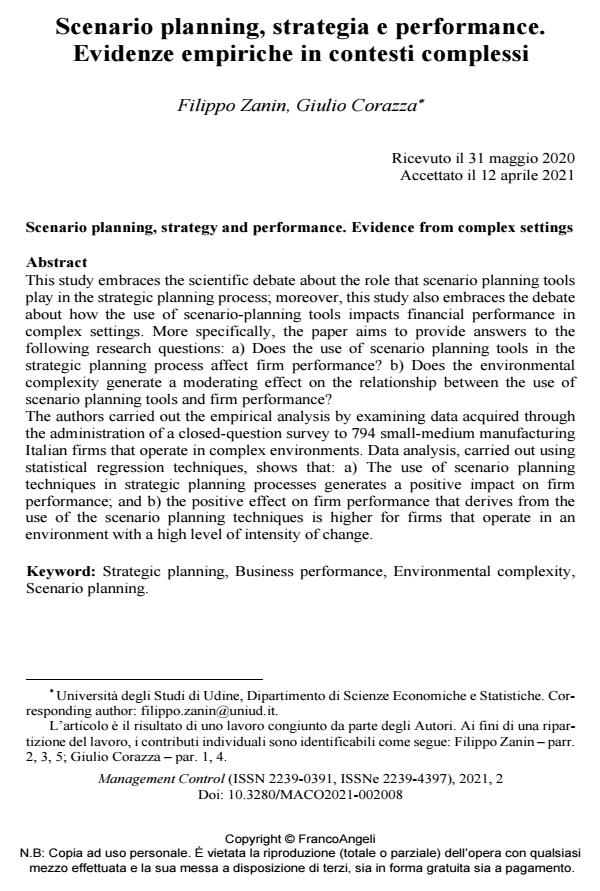Scenario planning, strategia e performance. Evidenze empiriche in contesti complessi
Titolo Rivista MANAGEMENT CONTROL
Autori/Curatori Filippo Zanin, Giulio Corazza
Anno di pubblicazione 2021 Fascicolo 2021/2
Lingua Italiano Numero pagine 18 P. 147-164 Dimensione file 277 KB
DOI 10.3280/MACO2021-002008
Il DOI è il codice a barre della proprietà intellettuale: per saperne di più
clicca qui
Qui sotto puoi vedere in anteprima la prima pagina di questo articolo.
Se questo articolo ti interessa, lo puoi acquistare (e scaricare in formato pdf) seguendo le facili indicazioni per acquistare il download credit. Acquista Download Credits per scaricare questo Articolo in formato PDF

FrancoAngeli è membro della Publishers International Linking Association, Inc (PILA)associazione indipendente e non profit per facilitare (attraverso i servizi tecnologici implementati da CrossRef.org) l’accesso degli studiosi ai contenuti digitali nelle pubblicazioni professionali e scientifiche
This study embraces the scientific debate about the role that scenario planning tools play in the strategic planning process; moreover, this study also embraces the debate about how the use of scenario-planning tools impacts financial performance in complex settings. More specifically, the paper aims to provide answers to the following research questions: a) Does the use of scenario planning tools in the strategic planning process affect firm performance? b) Does the environmental complexity generate a moderating effect on the relationship between the use of scenario planning tools and firm performance? The authors carried out the empirical analysis by examining data acquired through the administration of a closed-question survey to 794 small-medium manufacturing Italian firms that operate in complex environments. Data analysis, carried out using statistical regression techniques, shows that: a) The use of scenario planning techniques in strategic planning processes generates a positive impact on firm performance; and b) the positive effect on firm performance that derives from the use of the scenario planning techniques is higher for firms that operate in an environment with a high level of intensity of change.
Parole chiave:Strategic planning, Business performance, Environmental complexity, Scenario planning.
- Value-based Management System e performance. Il ruolo di moderazione della strategia ibrida e della turbolenza ambientale Filippo Zanin, Giulio Corazza, in MANAGEMENT CONTROL 3/2024 pp.63
DOI: 10.3280/MACO2023-003004
Filippo Zanin, Giulio Corazza, Scenario planning, strategia e performance. Evidenze empiriche in contesti complessi in "MANAGEMENT CONTROL" 2/2021, pp 147-164, DOI: 10.3280/MACO2021-002008